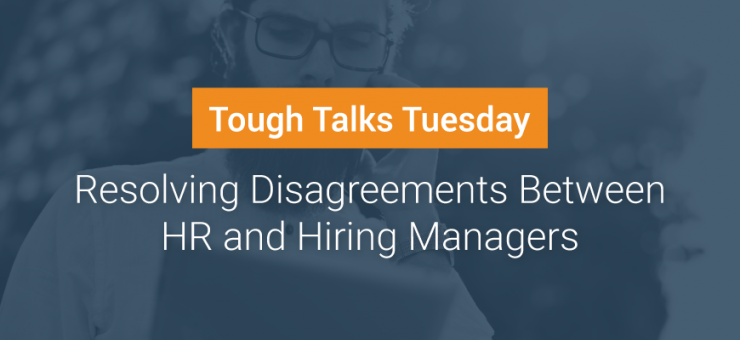Many factors that impact the hiring process are out of your team’s control. When tensions arise from external issues, your entire hiring team must work together to keep processes moving smoothly. Often, they must collaborate to make tough choices despite their different opinions, expectations, personalities, and ideas of what’s best for the company.
In an HRO survey, only 39.8% of hiring managers said they’re very satisfied with the talent acquisition support they receive from HR. When left unchecked, dissatisfaction with both sides damages your team’s ability to communicate and collaborate on hiring decisions. And without resolutions, the candidate experience and in-house morale drop dangerously low.
Not seeing eye-to-eye is generally viewed as a negative. However, it’s beneficial for hiring managers and HR pros to challenge each other. It opens up the hiring process to more diverse perspectives and collaboration.
Hiring managers and HR pros must come together and find practical solutions to move beyond healthy disagreements. Here are our tips to help keep your hiring decision-makers and HR on the same team:
The disagreement: job requirement criteria
Hiring managers and HR pros work together when hiring talent because each position offers unique and valuable insight into the decision-making process.
Hiring managers, for example, have a frontline understanding of their team’s current needs. They’re closest to the employees and have inside knowledge regarding team dynamics, how the role impacts productivity, and even what skills or traits the team currently lacks that keep them from reaching their highest potential.
On the other hand, HR pros have their sights set on the bigger picture. They are well-versed in how cultural fit impacts company success as a whole and understand how one ill-fitting hire can take down the entire system. Additionally, they’re keenly aware of what’s hurting and helping other hiring experts in the rapidly changing hiring environment.
For these dynamics to work productively, communication barriers must come down. Bring teams together to review hiring data and determine candidate must-haves. Hiring managers should come prepared with performance metrics and traits from top employees to showcase the personality types and skills necessary for application evaluation.
HR pros can gather quality of hire and first-year turnover rates to show how job performance, ramp-up time, engagement, and cultural fit all play into retention and overall company performance. You should also look at the reasons first-year turnovers exited to prove the case for job criteria must-haves.
Look at facts to settle hiring decisions rather than debating subjective evaluation criteria. These objective details give you informed discussion points to start working out details regarding job requirements that drive results.
The disagreement: qualification of candidates
Bait and switch tactics lead to grave misunderstandings between hiring managers and HR pros. For example, when a candidate isn’t honest on their application or during initial interviews, hiring pros will progress a highly-qualified candidate that ultimately delays the process later.
Sadly, dishonesty or exaggerating skills on applications is a prevalent problem. In fact, 85% of respondents in Monster’s State of the Recruiter survey said candidates exaggerate skills and proficiencies on their resumes.
Many underqualified candidates make it past the initial screening stages because of their exaggerations. Once they reach deeper stages of the interview process, hiring managers are more likely to realize they’re not actually qualified for the role. The repercussions of what started as a misunderstanding due to applicant dishonesty have the potential to lead to friction within the entire hiring team.
When this occurs, everyone needs to be open in discussions to uncover the root of the problem. Then, hiring managers and HR decision-makers can work together to determine what tools and technology will decrease the likelihood of evaluation errors in early screenings.
One-way interviews, for example, allow everyone to efficiently weigh in on the initial screening process. Hiring teams benefit from sending each candidate the same structured questions, as this makes it easier to detect those who exaggerated on their application.
Everyone is also able to review the candidates’ responses, which increases the likelihood of catching red flags early in the process. Because hiring managers and HR pros evaluate the exact same screening videos, you can easily discuss discrepancies in your feedback without needing to weigh conflicting in-person impressions.
The disagreement: choosing a candidate
Job seekers won’t wait around for everyone on the hiring team to agree. Actually, 40% of job seekers in Addison Group’s Workplace Survey said they’ll wait for a response from hiring pros a week after an interview before they lose interest in the job.
Don’t delay discussions regarding disagreements about choice candidates until an agreement needs to be made. Get on the same page from the start using interview collaboration technology. Our video interview platform, for instance, creates a continuous feedback-sharing loop.
Hiring managers and HR pros review video interviews on their own time. They can leave ratings and feedback other hiring team members can refer to after they complete their evaluation of a candidate. This information can be used to build on in-person interviews, ensuring aspects of many assessments are considered, and appropriate follow-up questions are asked.
Using the feedback hiring managers and HR pros provide, you can also identify significant issues in your underlying hiring processes. You might uncover, for example, your evaluation criteria or rating system need to be reevaluated.
For final decision-makers, collaboration software keeps the entire team’s evaluation discussions relevant and accessible. The ability to take everyone’s feedback into account before making an offer further unifies everyone’s role in the hiring process.











